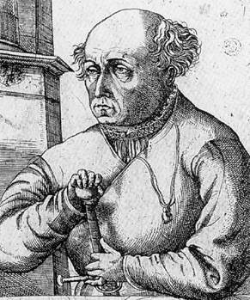Paracelsus (1493-1534)
Overview
Paracelsus (born Philippus Aureolus Theophrastus Bombastus von Hohenheimborn November 11 or December 17 1493 in Einsiedeln, Switzerland, died September 24, 1541 in Salzburg, Austria), sometimes called the "father" of toxicology. He was born to a chemist father in Switzerland in 1493 and contributed greatly to the fields of medicine and toxicology. He rejected Gnostic medicinal traditions such cauterizing wounds and amputating injured limbs and advocated keeping wounds clear of infection and allowing them to heal on their own. But also considered to be renaissance physician, botanist, alchemist, astrologer, and general occultist.
Paracelsus also pioneered the use of chemicals and minerals in medicine, coining the name of "zink" for what was to become modern day "zinc." He felt that sickness and health in the body relied on the harmony of man, the microcosm, and Nature of the macrocosm. He took an approach different from his medicinal predecessors by stressing that man must have a certain balance of minerals in their bodies, and that certain illnesses of the body had chemical remedies that could cure them. He was, therefore, a precursor to modern-day medicine and to the use of vitamins and minerals to maintain health.
He wrote on toxics:
"The dose makes the poison." (A popular short version.)
The original quote is:
German: 'Alle Ding sind Gift und nichts ohn' Gift; allein die Dosis macht, das ein Ding kein Gift ist.
English: All things are poison and nothing (is) without poison; only the dose makes that a thing is no poison.
In other words, the amount of a substance a person is exposed to is as important as the nature of the substance. For example, small doses of aspirin can be beneficial to a person, but at very high doses, this common medicine can be deadly. In some individuals, even at very low doses, aspirin may be deadly.
“Many have said of Alchemy, that it is for the making of gold and silver. For me such is not the aim, but to consider only what virtue and power may lie in medicines.”
Paracelsus was an alchemist, though he eschewed the common goal of chrysopoeia, the creation of gold from lesser metals; his interest was primarily medical. He was the main figure associated with Iatrochemistry, an early predecessor to pharmacology that combined alchemical and medical principles. He wrote extensively on the topic of alchemy, and some of his writings are available today: see the Hermetic and Alchemical Writings of Paracelsus pt. 1.
References
- Borzelleca, J. F.: Paracelsus: herald of modern toxicology. Toxicol Sci 2000, 53, 2-4.
- Hermetic and Alchemical Writings of Paracelsus pt. 1 Primary source; translation of Paracelsus' alchemical writings
- Paracelsus - National Library of Medicine
- Paracelsus - Wikipedia


